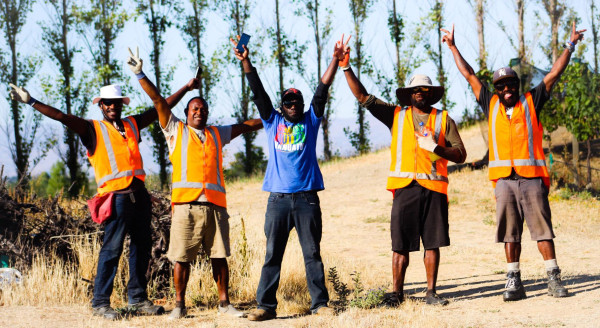Enhancing the Positives and Mitigating the Negatives of Labour Mobility for Vanuatu
15 Nov 2023
Vanuatu, like many other Pacific Island Countries, are confronted with the inherent development challenges of their smallness, remoteness from key markets, and vulnerability to natural disasters and climate change. These development constraints are coupled by a rapidly growing population the the local formal economy cannot absorb. A high number of school leavers are consequently left unemployed each year resulting in added social and economic pressures on the local economy and society.
Labour mobility has provided a critical employment creation strategy to generate growth dividends for Vanuatu. These positive development impacts are the key drivers for Vanuatu's participation in labour mobility and has propagated its status as the top labour sending country for both the Pacific Australia Labour Mobility (PALM) and New Zealand Recognised Seasonal Employer (RSE) schemes.
According to the Vanuatu Commissioner for Labour, Ms. Murielle Meltenoven, Vanuatu now has over 10,000 PALM workers in Australia and over 6,000 in New Zealand.
The economic benefits of labour mobility for Vanuatu are largely transferred through the remittances and skills acquired by workers. "We see benefits in skills development especially around employability skills. We've received a lot of positive feedback from businesses around the conduct of workers including in communication, specifically customer service around servicing, and their ability to speak English," Commissioner Meltenoven elaborated. She also highlighted the positive impacts on community development particularly in the rural areas including in upholding peace and order as unemployment is reduced. "When you travel around the six provinces (in Vanuatu), you see the real positive impact within the remote and rural communities around the new buildings, new businesses, so many banana boats which improve transportation helping many people residing in little islands to access crucial services," Meltenoven stated.

However, when it comes to building resilience against natural disasters, labour mobility has delivered mixed effects. In one hand, families and communities have more cyclone-resistant housing, but on the other, villages have less able-bodied men for post-cyclone recovery and rebuild. "Now you only see old people and kids, who are the most vulnerable during a period of natural disaster and in the recovery stage. They (villages) don't have strong people to help for the recovery and to rebuild the community and the homes so for them the recovery will be very slow,” Commissioner Meltenoven explained.
The loss of skilled employable people is also impacting local private sector development. "The private sector is suffering because they're losing their skilled workers, of which they have invested so much money, so much time to train up. For example, in the tourism and hospitality industry, I can see that the current services has dropped a lot, the quality is no longer there," Meltenoven stated. At the home front, she highlighted that social problems such as broken homes and domestic violence are rampant.
Commissioner Meltenoven believes that these negative impacts emphasise the importance of conducive policies and support programmes in both labour sending and labour receiving countries. She highlighted that the PACER Plus Implementation Unit (PPIU) has funded a review of their labour mobility policy which will govern their labour mobility programmes in Vanuatu. The World Bank is also conducting a study to assess the impacts on private sector and the ILO is assisting with regulatory reforms to address issues. Vanuatu is also engaged in discussions with Australia and New Zealand to reconsider visa conditions and the length of work contracts in an effort to address social issues at home.
Vanuatu, as host country of the 2023 Pacific Labour Mobility Annual Meeting (PLMAM) is also looking to optimise the opportunity to dialogue with key stakeholders on issues and to determine practical solutions. The PLMAM provides an opportunity for labour receiving and labour sending countries as well as other relevant organisations to come together to determine collective solutions that can maximise the positive impacts of labour mobility in the region whilst mitigating the negatives.
Subscribe today
Don't miss our latest updates and news about PACER Plus